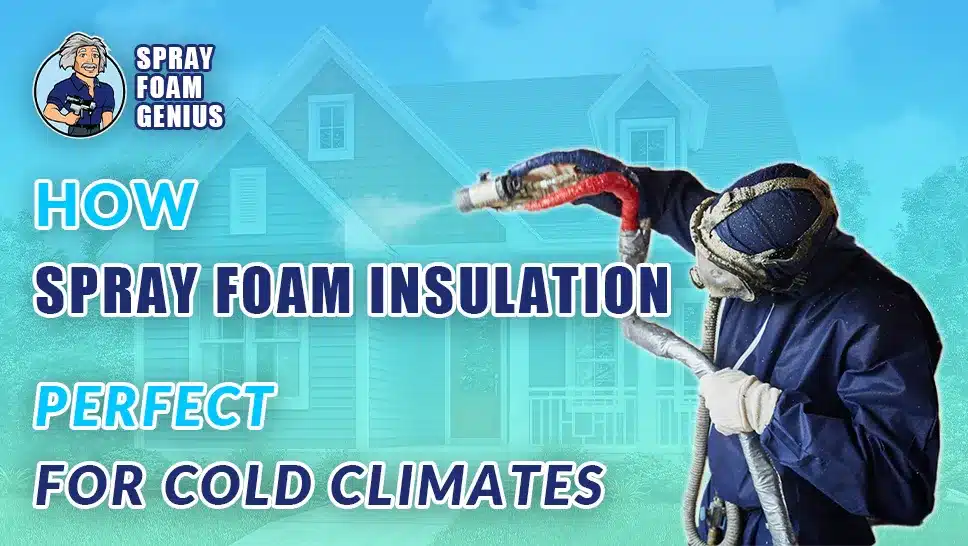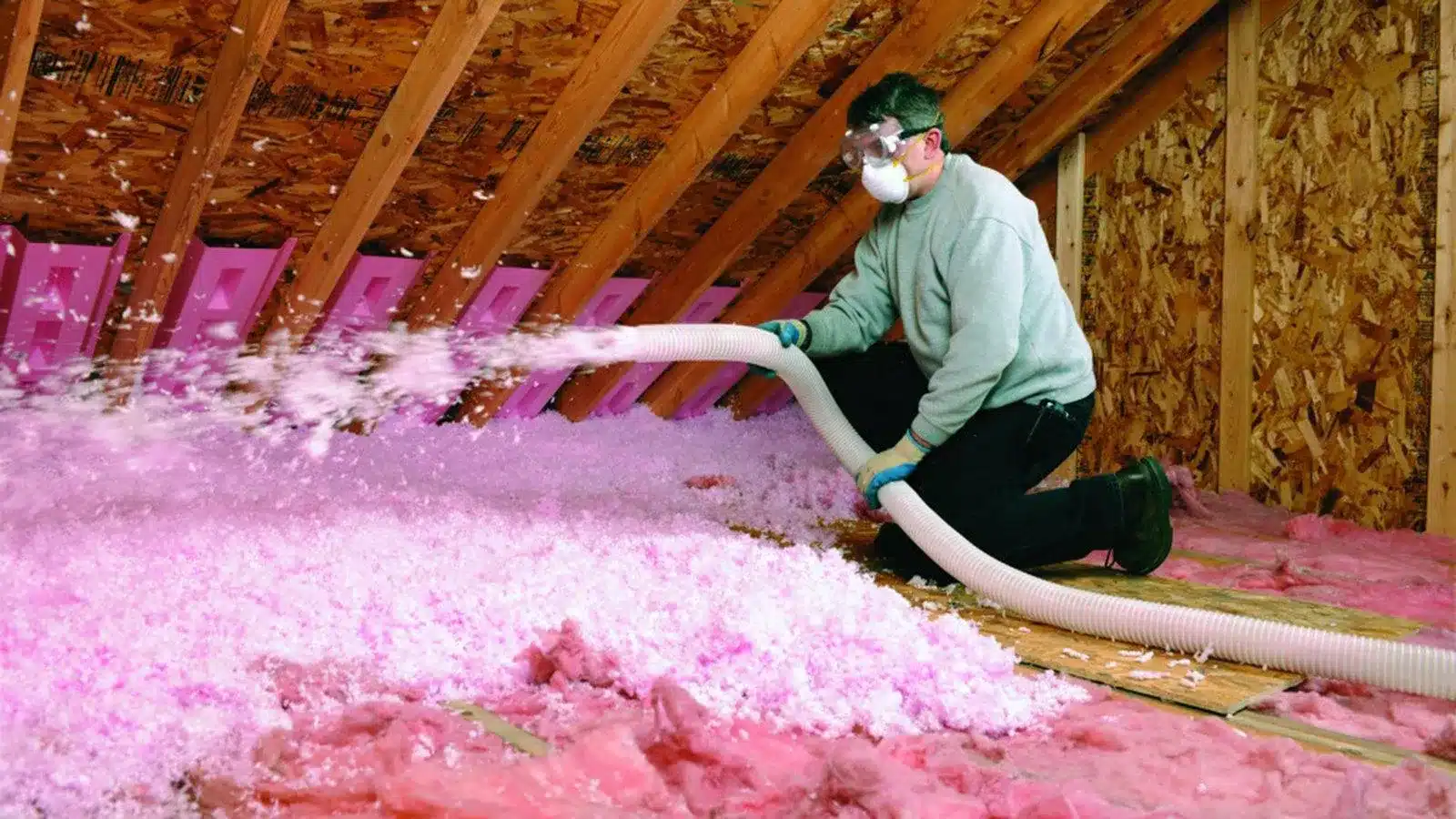
In regions known for their cold, harsh winters, maintaining a warm and energy-efficient home becomes a top priority. Cold climates pose unique challenges, such as significant heat loss, air leaks, and moisture problems. To address these issues effectively, choosing the right insulation material is crucial. Spray foam insulation has emerged as an exceptional solution for cold climates due to its superior performance in various aspects. This comprehensive guide will delve into why spray foam insulation is the ideal choice for cold climates, exploring its benefits, comparing it to other insulation options, and providing practical insights for homeowners.
The Importance of Effective Insulation in Cold Climates
Challenges of Cold Climates
Living in a cold climate presents several insulation-related challenges that can impact home comfort and energy efficiency:
- Heat Loss: In colder regions, homes often experience significant heat loss through walls, ceilings, floors, and other structural components. This loss of heat can lead to higher energy bills and reduced indoor comfort.
- Air Leaks: Drafts and air leaks can exacerbate heat loss, making it more difficult to maintain a consistent indoor temperature.
- Moisture and Condensation: Cold temperatures can cause moisture to condense on surfaces, leading to potential issues such as mold growth, structural damage, and reduced indoor air quality.
Effective insulation helps address these challenges by creating a barrier that keeps warm air inside and cold air outside. Spray foam insulation is particularly well-suited for this purpose, offering several advantages over traditional insulation materials.
How Spray Foam Insulation Excels in Cold Climates
Superior Thermal Performance
1. High R-Value
Spray foam insulation is renowned for its high R-value, a measure of its thermal resistance. The R-value indicates how well an insulation material can resist heat flow. Closed-cell spray foam insulation, in particular, offers a high R-value per inch of thickness. This means it provides excellent insulation even with a relatively thin layer, making it highly effective in maintaining warm indoor temperatures in cold climates.
2. Continuous Air Barrier
One of the key advantages of spray foam insulation is its ability to create a continuous air barrier. Unlike traditional insulation materials that may leave gaps and seams, spray foam expands to fill all voids, cracks, and crevices. This seamless application prevents air infiltration and heat loss, ensuring that your home remains warm and energy-efficient. The continuous barrier created by spray foam helps to eliminate drafts and maintains consistent indoor temperatures.
Moisture Control
1. Water Resistance
Closed-cell spray foam insulation is highly water-resistant. This characteristic is particularly valuable in cold climates where moisture can lead to problems such as freezing, thawing, and structural damage. The water-resistant nature of closed-cell foam helps to prevent moisture accumulation and reduces the risk of issues like mold and mildew. By keeping moisture out, spray foam insulation contributes to a healthier and more durable home.
2. Prevention of Condensation
Condensation can occur when warm, moist air comes into contact with cold surfaces, leading to potential moisture-related problems. Spray foam insulation helps to minimize condensation by maintaining consistent surface temperatures. This prevents the formation of condensation and reduces the likelihood of mold growth and structural damage. By creating a thermal barrier, spray foam insulation contributes to a more comfortable and moisture-free indoor environment.
Energy Efficiency and Cost Savings
1. Lower Heating Costs
One of the primary benefits of spray foam insulation in cold climates is its ability to reduce heating costs. By creating a tight seal and preventing heat loss, spray foam insulation helps to lower energy consumption. In cold climates, this can translate into significant savings on heating bills. The insulation’s effectiveness in maintaining indoor temperatures means your heating system doesn’t have to work as hard, leading to lower energy costs over time.
2. Long-Term Value
While spray foam insulation may have a higher upfront cost compared to some traditional insulation materials, its long-term value is substantial. The combination of energy savings, improved comfort, and moisture control provides a strong return on investment. Spray foam insulation’s durability and effectiveness make it a cost-effective choice for homeowners looking to enhance their home’s energy efficiency and comfort.
Comparing Spray Foam Insulation to Other Insulation Options

Fiberglass Insulation
1. Thermal Performance
Fiberglass insulation is a common choice for many homeowners, but it may not provide the same level of thermal performance as spray foam insulation. Fiberglass insulation tends to leave gaps and may have a lower R-value per inch compared to spray foam. In cold climates, where maintaining warmth is crucial, the superior thermal performance of spray foam insulation offers a distinct advantage.
2. Air Leakage
Fiberglass insulation does not create a continuous air barrier, which means it may not be as effective at preventing air leaks and drafts. Spray foam insulation, on the other hand, expands to fill all gaps and cracks, ensuring a more effective seal. In cold climates, this airtight seal provided by spray foam insulation helps to minimize heat loss and improve overall energy efficiency.
Cellulose Insulation
1. Settling and Compaction
Cellulose insulation, made from recycled paper products, can settle over time, reducing its effectiveness. This settling can create gaps and reduce insulation performance, especially in colder climates. Spray foam insulation does not settle or compact, maintaining its effectiveness over time and providing consistent thermal performance.
2. Moisture Sensitivity
Cellulose insulation is susceptible to moisture absorption, which can lead to issues with mold and reduced insulation effectiveness. In cold climates, this moisture sensitivity can be problematic. Spray foam insulation’s water-resistant properties help to prevent moisture accumulation and ensure long-term performance.
Rigid Foam Board Insulation
1. Installation Complexity
Rigid foam board insulation provides good thermal resistance but often requires precise installation and additional sealing. Spray foam insulation, in contrast, expands to fill all gaps and irregular surfaces, providing a more straightforward and effective solution. The ease of installation and comprehensive coverage of spray foam insulation make it a more practical choice for many homeowners.
2. Cost and Coverage
Rigid foam board insulation can be more expensive and less versatile in covering irregular surfaces compared to spray foam. Spray foam insulation’s ability to conform to any shape and size allows for complete and efficient coverage, making it a more cost-effective option in the long run.
Installation Considerations
Professional Application
To achieve the best results with spray foam insulation, professional installation is highly recommended. Proper application ensures that the foam expands correctly and forms a complete seal. Professional installers have the expertise and equipment needed to apply spray foam insulation effectively. At Spray Foam Genius Marketing, we specialize in connecting homeowners with experienced spray foam insulation contractors who can deliver high-quality installation services.
Cost vs. Value
While the initial cost of spray foam insulation may be higher than some other materials, its benefits often outweigh the expense. The long-term savings on energy bills, improved comfort, and enhanced durability make spray foam insulation a valuable investment for homeowners in cold climates. Considering the overall value and performance can help you make an informed decision.
Real-World Examples and Success Stories
Residential Case Study
In a residential home in North Dakota, the installation of closed-cell spray foam insulation in the walls and attic led to a remarkable improvement in energy efficiency and comfort. The homeowners reported a significant reduction in heating costs and a more consistent indoor temperature throughout the winter months. The spray foam insulation also helped to eliminate drafts and improve the overall comfort of the home.
Commercial Application
A commercial building in Alberta faced challenges with heat loss and high heating costs. By applying spray foam insulation to the building’s walls and roof, the property owner achieved substantial energy savings and improved the comfort of the building’s occupants. The insulation’s ability to create a continuous air barrier and control moisture contributed to a more efficient and comfortable commercial space.
Make the Smart Choice for Your Cold Climate Home
Choosing the right insulation for cold climates is essential for maintaining warmth, efficiency, and comfort. Spray foam insulation offers a range of benefits that make it an ideal choice for addressing the unique challenges of cold weather. With its superior thermal performance, moisture control, and energy efficiency, spray foam insulation can enhance your home’s overall comfort and reduce heating costs.
Ready to Upgrade Your Home’s Insulation?
For expert advice and top-quality spray foam insulation services, Call us at 877-840-FOAM for USA and 844-741-FOAM for Canada visit our website at sprayfoamgeniusmarketing.com, or email us at [email protected] to get started. Our team of specialists is here to connect you with professional contractors who can deliver exceptional spray foam insulation solutions tailored to your needs.
Take the first step towards a warmer, more efficient home today!
- 5 Google My Business Hacks to Double Your Leads for Spray Foam Insulation Contractors - January 14, 2025
- Why Spray Foam Contractors Cannot Ignore Reputation Management in 2025 - January 13, 2025
- Local SEO Secrets Every Spray Foam Contractor Must Know to Win in 2025 - January 13, 2025

